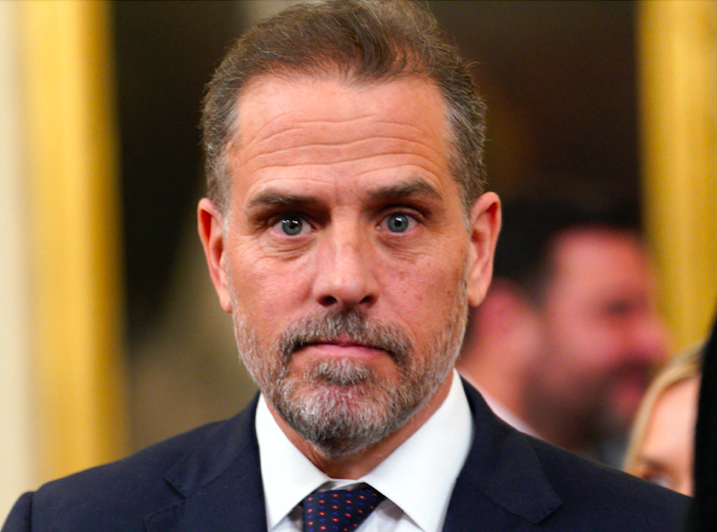The most remarkable thing about the tax-evasion indictment of Hunter Biden by now-Special Counsel David C. Weiss is that it happened at all.
The second most remarkable thing is Weiss’s allegation that Hunter simply decided not to pay income taxes. According to the indictment, “the Defendant had sufficient funds available to him to pay some or all of his outstanding taxes when they were due. But he chose not to pay them.”
The impunity with which he blew off paying suggests that he thought that he was untouchable. His explanation, seized on so completely by the media, that it was instead drug addiction that led to this behavior. Yet this claim is undercut by additional facts presented in the indictment:
Notably, in 2020, well after he had regained his sobriety, and when he finally filed his outstanding 2016, 2017, and 2018 Forms 1040, the Defendant did not direct any payments toward his tax liabilities for each of those years.
So even after Hunter had gotten clean, wrote a book about it (generating significant income), and filed tax returns for his “lost” years, he still believed that he didn’t have to pay taxes because he knew that the U.S. Attorney investigating his affairs had a mission to bury any evidence of criminality.
For five years, Weiss and his staff had cooperated and strategized with Hunter’s legal team to protect Hunter and his father. The New York Times came into possession of emails between the two parties and reported on August 19 that “Mr. Weiss appeared willing to forgo any prosecution of Mr. Biden at all, and his office came close to agreeing to end the investigation without requiring a guilty plea on any charges.”
The leaked emails revealed that this changed in the spring of 2023 after the testimony of Supervisory Special Agent Gary Shapley and Special Agent Joe Ziegler. They told the House Oversight Committee that the Justice Department prevented them from following the evidence trail to Joe Biden, tipped off to Hunter’s attorneys to an impending raid, and permitted the clock to run out on some felonies.
True to form, Hunter’s lawyers reacted by demanding that the Justice Department prosecute the whistleblowers for disclosing details of a criminal investigation (that had been subverted) to Congress. But that only put more pressure on Weiss.
The subsequent plea deal, whereby Hunter would plead guilty to a couple of misdemeanors, was still very favorable to Hunter. It was too favorable, it turned out. Judge Maryellen Noreika rejected it after a highly unusual dispute in her courtroom about whether it precluded the government from prosecuting Hunter for any past crimes.
Noreika inquired specifically about Hunter’s possible prosecution under the Foreign Agents Registration Act (FARA), an issue that NLPC has sought to keep alive since 2020 when we filed a Complaint with the Justice Department against Hunter, the Truman National Security Project, and the University of Pennsylvania and its Penn Biden Center for Diplomacy and Global Engagement.
In the wake of the blowup of the plea deal, the Justice Department attempted to regroup. On August 11, Attorney General Merrick Garland gave Weiss Special Counsel status, a curious move because for years Garland had resisted calls for just such an action by Republicans.
Garland had previously derided the idea, claiming Weiss actually had more power as a sitting U.S. attorney, prompting NLPC Counsel Paul Kamenar to ask in the Daily Signal, “Does that mean Weiss now has less authority?”
The Special Counsel designation was a rear-guard action, seemingly calculated to keep the criminal investigation from reaching President Biden, in the face of a mounting pile of evidence that he, while Vice-President, accepted tens of millions in bribes.
But to save Joe Biden, Weiss must conduct a real investigation and prosecution of Hunter, right up to the line, but never crossing it, of implicating the president. Weiss has become hostage to events he never anticipated.
In early 2023, the plan was for Hunter to plead guilty to a couple of minor infractions that carried no jail time. The White House, the Democratic establishment and the media could then proclaim the scandal to be over.
There were those, however, who refused to just watch the cover-up of the most serious criminality by a president in our history. They include the IRS whistleblowers, Rep. James Comer (R-KY), Chairman of the House Oversight Committee, some heroic people in the media, and watchdog groups like NLPC.
The problem for Hunter is that he never thought he would be accountable. That is why he was so utterly reckless. On September 14, Weiss charged Hunter with firearms violations. Now Hunter faces very serious tax charges. Kamenar believes that if found guilty, he will go to prison for one to three years.
Attention now turns to FARA. In April 2022, NLPC called upon Weiss to investigate Hunter for FARA violations and sent him a copy of the 2020 Complaint after media reports indicated that he had convened a grand jury. Although the request received significant media coverage, Weiss apparently ignored us.
With the reams of evidence recently unearthed by Rep. Comer and his committee implicating the president in Hunter’s shakedown schemes, Weiss will have to prosecute Hunter on FARA in order to control the criminal investigation so that he can keep it away from Joe.
Weiss probably never thought that the stakes of his coverup would become so high. Whereas he can charge people with crimes, and Rep. Comer cannot, it would seem Weiss has the winning hand. But he’s had a winning hand for five years, and he keeps losing.









